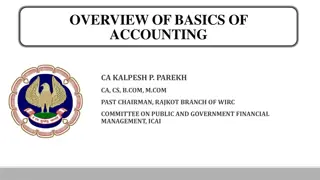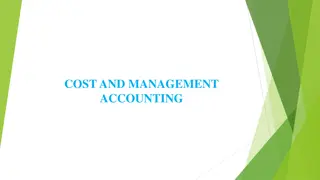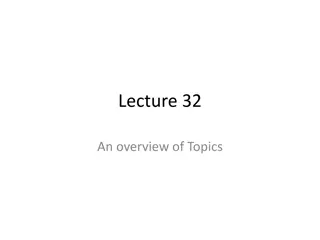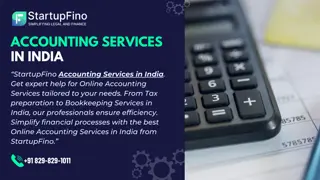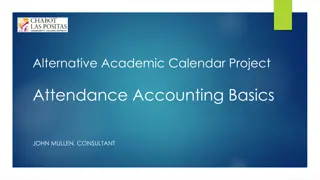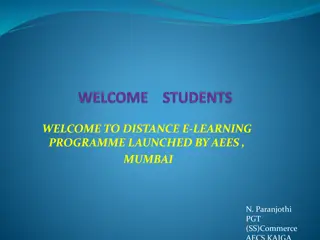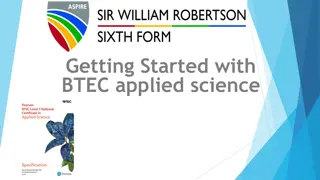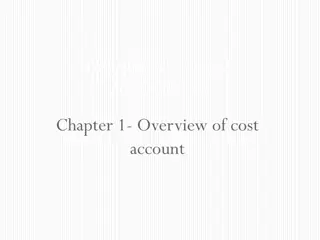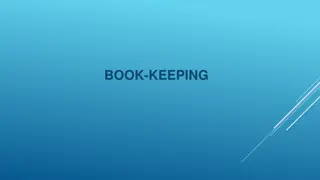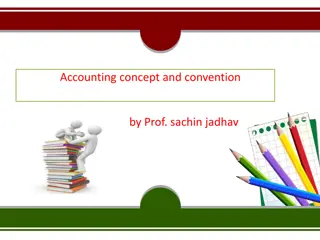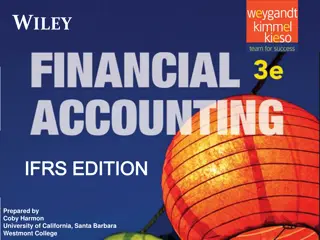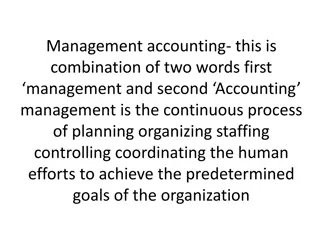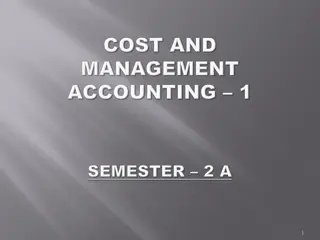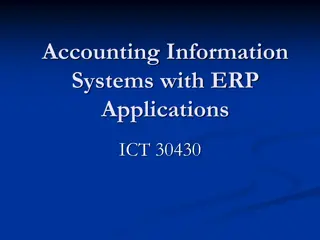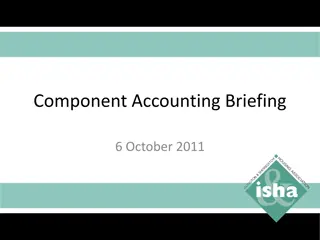Applied Accounting Programs Overview
This overview covers the Applied Accounting Programs offered at North Seattle College, providing training for a career in accounting through various degrees and certificates. Details include program description, entry requirements, educational pathways, and tasks accountants perform. Learn about the education pathway and how students develop skills in financial record management, tax preparation, and more to embark on a successful accounting career.
Download Presentation

Please find below an Image/Link to download the presentation.
The content on the website is provided AS IS for your information and personal use only. It may not be sold, licensed, or shared on other websites without obtaining consent from the author.If you encounter any issues during the download, it is possible that the publisher has removed the file from their server.
You are allowed to download the files provided on this website for personal or commercial use, subject to the condition that they are used lawfully. All files are the property of their respective owners.
The content on the website is provided AS IS for your information and personal use only. It may not be sold, licensed, or shared on other websites without obtaining consent from the author.
E N D
Presentation Transcript
Applied Accounting Programs Program Name Goes Here Presenter: Prof. Ron Woods Accounting Department Chair Presenter Name Goes Here
What is the program? Short Description The applied programs and degrees primarily provides students with the training for a career in accounting inoneof accounting s many related career pathways. AAS - AAS Associate of Applied Science Degree CERTIFICATES Accounting Achievement, Tax Preparer, Non-Profit Management. These degrees, education and training are all intended to prepare students to go right to work in the appropriately trained area of accounting. Where is this program offered? North Seattle College 9600 College Way N Seattle, WA 98103 Entry Requirements High School Diploma/GED Running Start or other similar high school/college programs
Quiz Time Which of the following notable people either worked in accounting or majored in accounting? John Grisham - bestselling author of such classics as The Firm and The Pelican Janet Jackson sister of the King of Pop, Michael Jackson, platinum record and five Grammys holder singer, and entertainer. Select the single best answer from the options below. A B . Kenneth Bruce Gorelick, better known as Kenny G, - world-famous saxophonist and top- selling instrumental musician in modern history. C Legendary Rolling Stones front-man Mick Jagger 1. A & F 2. A, F & C 3. E, F & B 4. A, F & D 5. All of them D Ron Woods Faculty Chair and distinguished professor of accounting, North Seattle College. Phil Knight Philanthropist, business magnate, and co-founder of Nike, Inc. F E
What do you learn? Below are among the many tasks that accountants perform for their clients. Organizing and maintaining financial records Evaluating financial operations and making recommendations to management about best financial practices Examining account books and accounting systems to make sure they are efficient and conform to accepted standards and accounting procedures Preparing tax returns and related tasks Examining financial statements to make sure they are accurate and meet legal requirements suggesting ways to increase revenue, reduce costs, and improve profits If we go back to the question of what accounting students learn in our programs They essentially learn the skills to do the above.
Education Pathway The Programs Presented in This Applied Accounting Break-out Session Are designed to be completed from two academic quarters, to two academic years if you are participating as a full-time student taking three courses per quarter. An academic quarter is approximately 11-wweeks on average. The length for any one part-time student might take to complete a given program varies with each part-time student, depending on the program selected and their personal schedule. While it is preferably for students to complete their program study as quickly as possible and in accordance with the respective program schedule, there are no requirements to do so. Student can start, stop, and resume program study to meet employment and personal needs. The nature of accounting courses and learning objectives require certain courses be completed before others. Consult with your advisor before deciding to pause your study or skip a quarter. Designed to be part of a longer education pathway? They a start with certificates that are stackable and generally connects to an associate s degree and BAS degree pathway. Many of the certificates qualify students to get employment right away. Still, more education is typically needed to start work in some fields.
There are Basically Four Types of Accounting Public Accounting Corporate Accounting Government Accounting Forensic Accounting Corporate accounting involves the use, handling, and filing of a company s financial data often for the purpose of external reporting and tax compliance. Government accountants work within the context of local, state, or federal government entities. They often work within frameworks that differ from those employed by public accountants. Public accountants work with external clients, most often companies, corporations, or individuals. Their responsibility to clients is to help ensure their financial statements, records, and filings are accurate. Generally, Requires The Following: Forensic accounting refers to a branch of accounting that collects, recovers, and reconstructs financial data when it is difficult or impossible to obtain. 4-year degree in accounting or higher. 4-year degree in accounting or higher. 4-year degree in accounting or higher. 4-year degree in accounting or higher. *CPA preferred but not required. CPA required. CPA preferred but not required. CPA preferred but not required. Experience required. Some experience preferred. Some experience preferred. Some experience preferred *experience required before CPA license can be issued.
Government and Non-Profit Accounting Jobs: Private Accounting Jobs: Accounting Clerk Fund Accountancy Careers in Careers in Accounting Accounting Accounts Payable/Receivable Clerk IRS Jobs Bookkeeping Budget Analyst Comptroller/Financial Controller Payroll Accountant Public Accounting Jobs: Financial Services: Cost Estimator Business Valuation Specialist Enrolled Agent Certified Financial Planner Forensic Accountant Financial Analyst Real Estate Appraiser Tax Consultant Tax Accountant Tax Attorney Tax Preparer
What you can you earn with skills and/or a degree in Accounting? There are several internship or work-based learning programs offered. Program graduates typically work across the full spectrum; private business, government, and not-for-profit industries. Average wages for local area entry level to experienced varies. However, you can expect to earn from $39,000 to $48,000 after completing a certificate and/or 2-year accounting degree. If you complete a Bachelor's degree, you can expect to start on average, at a salary of around $61,513.
NOTE: Salary ranges can vary widely depending on many important factors, including education, certifications, additional skills, the number of years you have spent in your profession. For more detailed information and planning, visit the following site: https://seakingwdc.emsicc.com/?radius=5%20miles®ion=Seattle%2C%20WA Salary Ranges for Entry Level Accountants in Seattle, WA is: From $61,513 to $96,263, with a median salary of $94,771. The middle 67% of Entry Level Accountants makes $75,275, with the top 67% making $76,460. Salary Ranges for Bookkeepers is: Between $42,573 and $54,416. The average in Seattle as of March was $48,509. Salary Ranges for Tax Preparers in Seattle, WA: Entry level of $65,945 and a senior level of $115,404. Salary Ranges for Financial Services Jobs in Seattle, WA is: Between $39,000 atentry and $58,000 at the median. Note: Jobs in this area vary greatly and includes fields such as banking, financial planning, property management, etc. Workers in this industry often earnconsiderablymore than the median.
Q & A Ifyou have any questionsabout a typical studying accounting at NSC such as: What is a typical accounting course workload and schedule? Do students often balance work with school? What type of faculty are teaching in this program? My contact information is listed below. If you have questions about college admissions, advising, etc., I encourage you to stick around for help from 4:30-5pm. Contact: Program Coordinator Ron Woods ronald.woods@seattlecolleges.edu Workforce Instruction Division
Next Session Return to Main Session (select Leave Breakout Room to return)





